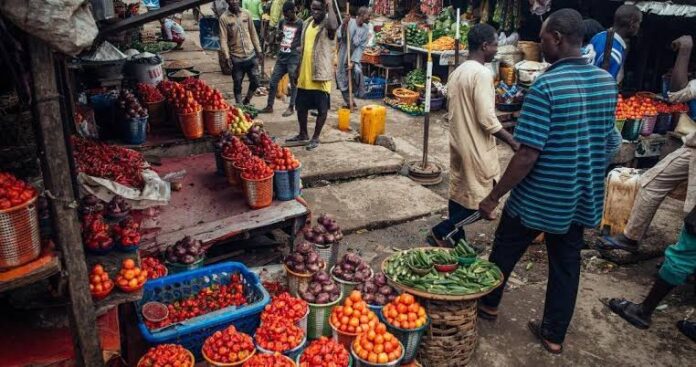Kenneth AFOR, LAGOS
Analyst proffers solutions to Nigeria’s rising inflation
According to the National Bureau of Statistics (NBS), Nigeria’s inflation figure in the month of June 2022, surged further to 18.6 percent compared to 17.71 percent recorded in the previous month.
This has resulted in an exponential increase in the prices of goods and services in the country.
READ ALSO: NEPTUNE FEATURE: How inflation is affecting ram offering at this year’s Sallah (Video)
Taking a look on the effect of the consistent rise of inflation figures the highest in more than five years on prices of consumables – according to data by the NBS, the average price of 1kg of beans rose on a year-on-year (Y-o-Y) basis by 24.17 percent from N431.79 in June 2021 to N536.17 in June 2022. Also, on a month-on-month basis, this increased by 2.19 percent from N524.70 in May 2022.
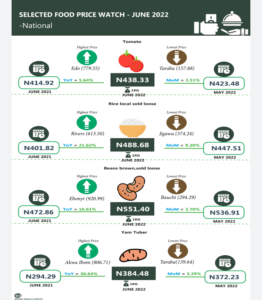
The average price of 1kg of yam tuber increased on Y-o-Y basis by 30.64 percent from N294.29 in June 2021 to N384.48 in June 2022 while month-on-month basis, the average price of this item increased by 3.29 percent in June 2022.
Similarly, the average price of 1kg beef (boneless) rose by 26.83 percent on a Y-o-Y basis from N1,639.96 in June 2021 to N2,079.93 in June 2022.
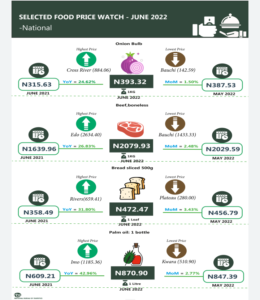
In addition, the average price of Groundnut oil: 1 bottle, specify bottle stood at N1,062.90 in June 2022, showing an increase of 42.07 percent from N748.16 in June 2021 while on a month-on-month basis, it rose by 2.12 percent from N1,040.88 in May 2022.
On transport services
The average fare paid by commuters for bus journeys within the city per drop, increased by 0.10 percent, on a month-on-month from N582.06 in May 2022 to N582.61 in June 2022. In terms of year-on-year, however, the average fare paid by commuters for bus journeys within the city per drop rose by 42.02 percent from N410.23 in June 2021 to N582.61 in June 2022.
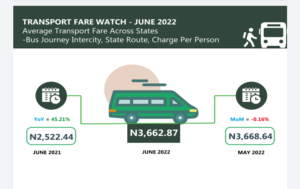
The average fare paid by commuters for bus journey intercity per drop rose to N3,662.87 in June 2022 indicating a decline of -0.16 percent on a month-on-month compared to the value of N3,668.64 in May 2022.
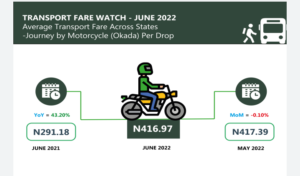
On a year-on-year, the fare prices rose by 45.21 percent from N2522.44 in June 2021.
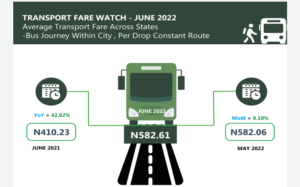
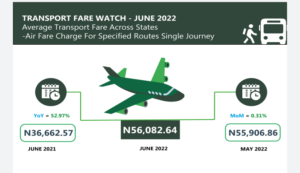
Explaining how Nigerians especially the middle income earners and the low income earners arrived at this unpleasant situation five years down the line, Oluwafemi Osinubi, a Portfolio Manager with FSDH Capital and an economic analyst, in a chat with Neptune Prime said the true causes of the current inflation figure were fundamentally driven by the cost of production of goods and services and not the demand of it.
It is no news that currently Nigeria is suffering from infrastructural deficit where manufacturers budget a fortune to power their diesel engine to keep production running round the clock. A key factor mentioned by the analyst.
Another factor responsible for high inflation figures is the consistent distortion of production of farm produce. Farmers in the northeast, northwest and some parts of the north central of the country where a bulk of the nation’s agricultural produce come from hardly go their farmlands to cultivate and or harvest their crops due to the heavy presence of terrorists in the region – when there are no enough produce to go round for a population of around 200 million people the law of demand and supply will set in.
“Basically, the current inflation we are faced with in Nigeria today happens to be driven by cost and not demand. Infrastructure has to be in place for businesses to run well in any country. Nigeria’s long-standing infrastructural deficit is stifling businesses as input cost and movement of goods become extremely high. Imagine the cost of powering business, it is killing. Secondly the supply side of food has also gone lower given the worsening insecurity in the country. Farmers have been deserted from their farmlands and those that managed to harvest loose substantial part of their produce to terrorists. Thirdly, pass through inflation from the depreciation of the Naira against USD (United States Dollar) is making imported items more expensive,” the analyst noted.
The implications of this according to the analyst is that we will have a situation in our hands where prices of goods that one would ordinarily delay to buy today for tomorrow would skyrocket by the time when one is ready to buy.
Also, more graduates will be thrown into the unemployment market because companies would want to continue to be in business by reducing their staff strength.
Furthermore, as inflation rises the purchasing power of the citizens shrinks thereby depleting the country’s economy.
“The economic implications are very obvious – lower purchasing power on the side of the citizens because volume of things you can afford to buy with the same level of income decreases. As volume of purchases continue to decline, the impact is that manufacturers produce less, so overall output, measured by GDP (Gross Domestic Production (GDP) slows. The unpalatable effect of these two combined situations is now evident in the living standard of the citizens, and reduced government revenue,” the analyst added.
What the government needs to do avert further surge of inflation
It is believed that part of the social contract between the government and the people is that of creating an enabling environment for systems to run seamlessly. Government cannot shy away from its responsibilities in terms of providing and fixing the infrastructure. Since this current administration cannot adequately operate without borrowing to execute most of its projects and take care of expenditures, the analyst proffers that government at all levels should partner with the private sector to fix the infrastructure such as provision of network of roads from the farms to the markets, fixing inter-state roads to ease the transportation of farm produce from one region to the other.

The administration came in with a mantra – to win the war against insurgency but 7 years down the line, nothing to show in this regard. Farmers are being asked by terrorists to pay tax before going to their farmlands, some get killed, their farms and produce destroyed. A drastic reduction of terrorists’ activities in these regions can do a whole lot good in solving the rising inflation figures, says the analyst.
“As simple as fixing the infrastructure through Private Public Participation (PPP) arrangement, ensure right policies are in place to encourage private businesses and import substitution, and also fight insecurity to a standstill position. Working on these three things alone would reduce inflation figures drastically,” he said.
Follow the Neptune Prime channel on WhatsApp: https://whatsapp.com/channel/0029Va74ZvU2v1IqKByXoX3d
Do you have breaking news, interview request, opinion, suggestion, or want your event covered? Email us at neptuneprime2233@gmail.com

